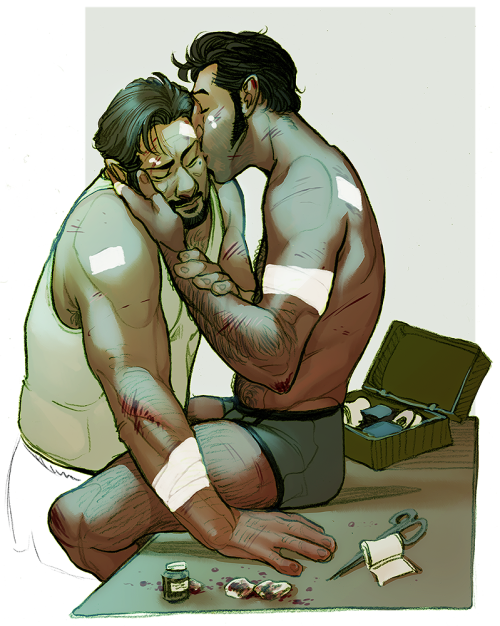#good fucking food
I finished s1 of OFMD, and I have Thoughts. I am, of course, not going to inflict them all on you, but I do want to point out one place where my reading/reception of the show and its characters diverged wildly from other reception I’ve seen. And it’s here: I think Stede spends much (most) of the first season as a terrible person who hasn’t unlearned the toxic masculinity of the patriarchal structures he’s steeped in and benefited from. Moreover, I think this makes the show better and more interesting than it would be with the Naive and Sanguine Gay Man Runs Away To Sea narrative. Polysemy is cool and all, and this show is obviously into that, but here’s my case, put briefly in a series of responses to examined objections. [Spoilers, obviously, ahead.]
“He abolishes the plunder system in order to establish a kindlier, gentler piracy!” …He abolishes the plunder system and reestablishes the salary system of the British Navy. I’m not saying he’s being disingenuous when he tells the crew what he wants to do. But what it amounts to is also replicating the only system he’s used to.
“He tells the pirates bedtime stories!” Hmm yeah. Put another way, he runs away from the patriarchal system in which he is such a signal failure, and from which he has been shown to be voluntarily disengaged, to recreate anotherpatriarchal system in which he can have (or at least playact) absolute control. On the Revenge, in contrast to his household, he can be the patriarch who has supreme authority andwho shows care (in ways of his choosing) to be rewarded with love in return. The fact that he recreates a gentleman’s sanctum (library, wardrobe, pantry) is also significant, I think.
“He likes marmalade, aww!” He’s not Winnie the Pooh. He increased the entire crew’s risk of starvation because he likes Seville marmalade on his toast. Here and elsewhere, he is shown to be stunningly self-centered (though not self-aware.)
“He just doesn’t understand how to cope with society!” Oh, I think he understands perfectly well; he just doesn’t want to. After all, he understands both the mores of the aristocratic class and how to manipulate them, as illustrated at the party. When he decides to unleash “passive aggression,” moreover, he does so in ways that are strikingly vicious. It’s a scene played successfully for comedy, of course; these are terrible, exploitative people who are a hairsbreadth away from tearing out each other’s throats in order to preserve respectability. But also: Stede is ready to destroy their lives and like it.
“He just likes drama and wants to make Ed happy!” He does want to make Ed happy, yes. He is dangerously, incorrectly confident that he knows what that means. The art of fuckery, for instance, is achieved despite Stede, with the crew on their own initiative using ideas he vetoed in his authoritarian snit.
For all these reasons, I think that the end of e7, where Blackbeard suggests co-captaining, is a really important moment in Stede’s character development. He is – finally! – relinquishing his need for absolute control. It is only in partnership with Blackbeard, in other words, that he can actuallystart moving towards a less hierarchical, less authoritarian, even queered (ahem) model of piracy and life.
After e7, in a non-linear fashion (!), we see Stede making progress. But it still seems entirely plausible to me that Blackbeard would decide that, when it came to a moment of crisis, Stede would decide on the comfort zone of familiar patterns rather than a high-risk sailing into the great unknown. There’s enough truth in Badminton’s nocturnal monologue to make it sting. (After all, it is Ed who is equated with Peter Pan, who thinks that even Death will be an awfully big adventure. Stede is equated with Pinocchio, who just wants to be accepted as normal in/by society.)
In a very satisfyingly classic dramatic move, Stede literally descends to the brink of death, in ways that are hilariously overkill: first Badminton tries to shoot him, then Mary tries to Jael-and-Sisera him (I support her), and then he finally does “perish” …in a coup de theâtre that requires him to receive help from people he has previously ignored or despised or both. This, not e6, shows him as a full participant in collaborative fuckery. So Stede, having gone like Gilgamesh and Odysseus and Aeneas to the land of the dead, can finally return and start being a hero on the model he (with a kindly assist from the crew) previously deluded himself into believing he was. That’s what I call a season finale.
we know it’ll soon collapse
thanks to @phd-mama for giving me some kissing prompts to get me out of writer’s block. makeout scenes are hard :(
fluff: kitchen counter make-outs
drama: ‘if we get caught kissing we’re dead but let’s risk it’’
how about both AO3
“Not here,” Draco says, but the edge of the counter scrapes against his trousers, and now he has to bend his neck to whisper into Ha—Potter’s lips. “Not here.”
“Where else, then?” Potter says. Heat presses against the corner of Draco’s mouth, dampening it.
The bathroom. The broom closet, hell, even the pantry. Not the fucking kitchen, the second-most visited place in this household other than the living room. And goddamn, it’s just down the hall. Potter’s hands squeeze Draco’s waist at his silence, then slide up, not really lingering anywhere, as though just checking if the angles and lines of his body are like what Potter remembers.

